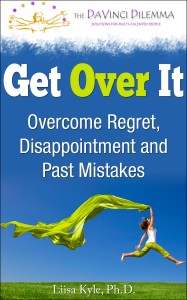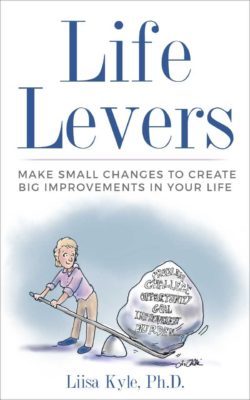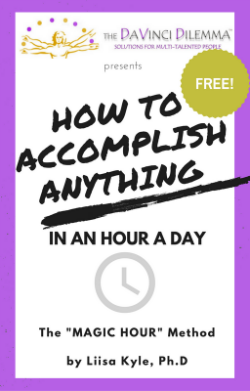One of the most effective ways to overcome regrets or to overcome events your past is to forgive yourself and others for whatever happened. Forgiveness and self-forgiveness aren’t always easy, but the benefits of doing so are many and profound. Today’s post highlights the benefits of forgiving yourself and others as well as providing some detailed tips for doing so. (Please note that this material is excerpted and adapted from my book Get Over It: Overcome Regret, Disappointment and Past Mistakes.)
Regardless of how kind we try to be, each of us have been hurt by someone else — and each of us has hurt someone else. Just as we must apologize and ask forgiveness when we do wrong, it’s only fair that we forgive those who wrong us.
Sometimes that’s not easy. When someone hurts us, there is a natural resistance to responding with kindness. But forgiveness is not approval for what occurred. Forgiveness is not ‘letting someone off the hook’. Forgiveness is an acknowledgment that we all make mistakes.
“But you don’t understand,” you may protest. “They were wrong! They hurt me badly! Why should I forgive them?” Well, ask yourself this: would you rather be right or would you rather be healed? If you want to heal, you must forgive them.
Truthfully, forgiveness is letting YOU off the hook: it’s a way to release the pain, the anger, the fear and the resentment we experience when someone hurts us. Forgiveness gives us the opportunity to heal and move on.
The alternatives don’t work. Lashing back or seeking revenge is never as satisfying as we imagine. Harsh actions injure us in the long run. Holding grudges and hard feelings against those who have harmed us hurts us much, much more than it affects them.
The longer we let resentments and regrets fester, the more we are damaging our own happiness. It’s impossible to be happy if we are bearing burdens from the past. Who does it serve if you are walking around, bitter and seething about something that happened a decade ago…while the person who hurt you can’t even remember your name, let alone the incident? Grudges hurt you, not them.
“But it’s too late,” you may say. No, it isn’t. When you hurt someone, it’s better to apologize immediately, of course. But it’s better to apologize late than not at all. Forgiveness works the same way. We can be way overdue when it comes to forgiving others. But as soon as we do, we can heal. And we can’t move forward until we forgive.
“But I don’t even know where they are, what they’re doing, if they are even alive,” you might counter. It doesn’t matter. If you can forgive someone in person, it’s powerful. But you can also forgive someone without them knowing anything about it. It doesn’t matter where they are or what they’re doing — you have the power to forgive them, right here, right now.
Forgiveness is really a gift you give yourself. You’ll feel the difference in your own heart when you truly forgive someone. There’s a little shift, deep down. It feels like relief. It’s the first step to replacing the pain of the incident with peace and joy. Imagine what it would feel like to erase your regrets!
Now, it’s one thing to forgive someone else – it’s another to forgive yourself. Many of us are hard on ourselves. We expect perfection. We punish ourselves for mistakes we’ve made. But if we insist on carrying negative experiences and regrets from our past, we are needlessly denying ourselves happiness in the present.
We need to forgive ourselves. We deserve being treated kindly and compassionately – even by ourselves. As human beings, we all make mistakes. Whatever it is, forgive yourself. You deserve the same courtesy you would give someone else. Imagine the relief of truly forgiving yourself! Picture yourself laying those unnecessary burdens down…and stepping into happiness.
That is the power of forgiveness.
*****
Let’s say you’ve been wronged. Someone did a bad thing. Now what are you going to do about it?
- You can stew — keep it all inside, festering. That only hurts yourself.
- You can play the victim. You tell everyone what a horrible thing happened to you – spread the word about what a terrible person the perpetrator of the incident is. This only foments negativity and spreads the pain.
- You can lash back — seek revenge or payback. This may give you momentary satisfaction but it won’t feel nearly as satisfying as you anticipated – and it will not heal your pain.
- You can forgive them and move on. If you want to heal — if you want to be happy, forgiveness is the answer.
Activity: Take a moment to make a forgiveness inventory.
1. Who do you need to forgive? What grudges are you holding?
2. Choose someone from your initial answer
– What is it costing you to hold these resentments? How does it make you feel? How does it affect how you are living your life?
– What benefits might there be to forgiving them? How would you feel? How might it improve your life?
– Imagine this person as a child, helpless and alone. Could you have compassion for them in that circumstance? Can you acknowledge that they are a fallible human being, susceptible to making mistakes? You don’t need to justify or approve of what they did. But can you forgive them?
3. Forgive them. Take a moment and release the burden you’ve been carrying.
Activity: Forgive yourself.
1. What do you need to forgive yourself for? What regrets are you holding?
2. Select one item from your list.
– What does it cost you to carry this burden?
– What benefits would there be to forgiving yourself? How would you feel? How would it change how you are living your life?
– What’s stopping you from forgiving yourself? Why are you denying yourself this relief?
– What can you do to forgive yourself?
3. Take a moment. Acknowledge that you are a fallible human, that you make mistakes and that you deserve forgiveness for them. View yourself with compassion and kindness. Forgive yourself.
*****
For more, check out my book “GET OVER It: Overcome Regret, Disappointment and Past Mistakes”. Available here: http://bit.ly/GetOverItNow
*****
If you’d like to share or publish this article, you may, if you include the author’s name, a link to this original post and the following text blurb:
This material is excerpted and adapted from my book “GET OVER It: Overcome Regret, Disappointment and Past Mistakes”. Available here: http://bit.ly/GetOverItNow
Are you struggling with too many talents, skills, ideas? You may have The Da Vinci Dilemma™! Find tools, fun quizzes, coaching, inspiration and solutions for multi-talented people at http://www.davincidilemma.com/.




